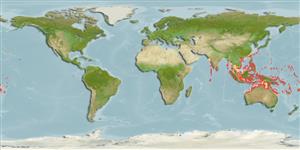Common names from other countries
Environment: milieu / climate zone / depth range / distribution range
पारिस्थितिकी
समुद्री प्रवाल-भित्ति संयुक्त; गहराई सीमा 4 - 46 m (Ref. 9710), usually 10 - 20 m (Ref. 27115). Tropical; 24°C - 28°C (Ref. 27115); 30°N - 24°S, 70°E - 171°W
Indo-Pacific: Maldives (Ref. 2334) to Samoa, north to the Ryukyu Islands, south to the southern Great Barrier Reef and New Caledonia.
आकार / वज़न / Age
Maturity: Lm ? range ? - ? cm
Max length : 8.0 cm TL पुल्लिंग / अलिंग; (Ref. 26587)
पृष्ठीय रीढ़ (सम्पूर्ण): 10; पृष्ठीय सौफट रेज़ (सम्पूर्ण): 12; गुदा कांटा 3; ऐनल सौफट रेज़: 6. This species possess numerous short filaments at the tip of each dorsal spine. Thickened and elongate lower pectoral rays.
Shallow coastal to outer reef flats and slopes to 45 m depth (Ref. 48636). Common inhabitant of coral reefs, typically resting at the bases of coral heads (Ref. 9710). Studies indicate that it is haremic and spawns nightly (Ref. 37816). Occasionally in pairs (Ref. 48636). Sometimes solitary (Ref 90102).
Life cycle and mating behavior
परिपक्व अवधि | पुनरुत्पत्ति | मछलीऔ का अंडे देना | अंडे | Fecundity | लार्वा
Pelagic spawner (Ref. 31569). Spawning ascents into the water column occurred over a distance of 0.2 to 0.6 m (Ref. 54536).
Randall, J.E., G.R. Allen and R.C. Steene, 1990. Fishes of the Great Barrier Reef and Coral Sea. University of Hawaii Press, Honolulu, Hawaii. 506 p. (Ref. 2334)
IUCN Red List Status (Ref. 130435)
CITES (Ref. 128078)
Not Evaluated
Threat to humans
Harmless
Human uses
मात्स्यिकी: कोई रुचि बग़ैर; जलजीवालय: व्यापारिक
अधिक जानकारी
संदर्भजलीयकृषिजलीयकृषि रूपरेखाखींचआनुवंशिकीElectrophoresesहैरेटिबिलटीबीमारीप्रक्रमणMass conversion
साधन
Special reports
Download XML
इंटरनेट स्रोत
Estimates based on models
Preferred temperature (Ref.
115969): 25.2 - 28.9, mean 27.8 (based on 206 cells).
Phylogenetic diversity index (Ref.
82804): PD
50 = 0.5039 [Uniqueness, from 0.5 = low to 2.0 = high].
Bayesian length-weight: a=0.01288 (0.00604 - 0.02750), b=2.99 (2.79 - 3.19), in cm Total Length, based on LWR estimates for this species & (Sub)family-body (Ref.
93245).
Trophic level (Ref.
69278): 4.0 ±0.65 se; based on food items.
Fishing Vulnerability (Ref.
59153): Low vulnerability (10 of 100).
